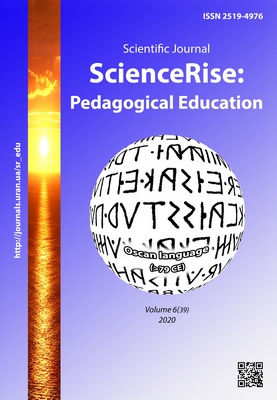Формування свідомого відношення студентів в умовах глобалізації до занять з технічного перекладу
DOI:
https://doi.org/10.15587/2519-4984.2020.217309Ключові слова:
технологія, глобалізація, переклад, системність, управління, навчання, особистість, рівень, професіоналізм, предметиАнотація
У даній роботі розглядаються технології управління процесом формування спрямованості особистості студентів вузів в умовах глобалізації на заняттях з технічного перекладу з позиції системного підходу. Спостереження вказують, що студенти технічних напрямків використовують вибір мови для перекладу не з метою розширити свій загальний кругозір і підвищити освітній рівень, скільки з наміром отримати конкретні знання, компетенції, необхідні в сьогоденні і майбутньому. В умовах глобалізації та інтеграції має місце відтік студентів за кордон. Перед системою освіти постає завдання підвищення своєї конкурентоспроможності. Викладачам з технічного перекладу необхідно: ставити чіткі, добре підготовлені студентам завдання; розкривати наукове обґрунтування педагогічних принципів і рекомендованих методичних положень; застосовувати оптимальні навантаження в завданнях; перед виконанням нових вправ давати короткі пояснення; застосовувати живу мову; враховувати спільність цілей; створювати підгрупи, спрямовані вибірки в залежності від особливостей студентів. Сучасні автономія і дистанційне навчання пов'язані з формуванням у них готовністі та звички самостійно, активно працювати, вміння усвідомлено оцінювати свій лінгвокультурний досвід і вміння коригувати його, приймати свої власні незалежні рішення і брати відповідальність за результати технічного перекладу. Реалізація даного принципу передбачає оволодіння студентами різних стратегій роботи з мовою, в основі яких лежать міждисциплінарні предмети навчального плану.
Виконання індивідуальних, диференційованих за рівнем складності і тематики завдань розвиває навички самостійної роботи, умінням працювати з довідковою літературою, самостійно оформити і передати іншим отриману інформацію, розвиває мислення і творчі здібності
Посилання
- Nalivaiko, N. V., Ashilova, M. S. (2015). Globalizatsiia obrazovaniia i globalnye vyzovy sovremennosti. Filosofiia obrazovaniia, 1 (58), 26–37.
- Sidorenko, E. V. (2013). Osobennosti issledovaniia geopoliticheskoi kartiny mira v usloviiakh globalizatsii. Filosofiia obrazovaniia, 1 (46), 4–9.
- Dubicka, I., Keeffe, M. O. (2013). English for International Tourism. Pearson Education Limited, 128.
- Panov, S. F. (2008). Qualitatsmanagement und Qualitatssicherung im Ausbildung. Naukovi zapysky. Seriia “Pedahohichna”, 9, 571–574.
- Nikolaeva, S. Yu. (Ed.) (2003). Zahalnoievropeiski Rekomendatsii z movnoi osvity: vyvchennia, vykladannia, otsiniuvannia. Kyiv: Lenvit, 273.
- Alekseeva, I. S. (2006). Ustnii perevod rechei. Nemetskii iazyk. Saint Petersburg: Iniazizdat, 112.
- Komissarov, V. N. (2002). Lingvisticheskoe perevodovedenie v Rossii. Moscow: ETS, 184.
- Latyshev, L. K., Semenov, A. L. (2005). Perevod: Teoriia, praktika i metodika prepodavaniia. Moscow: Izdatelskii tsentr «Akademiia», 192.
- Chernovatyi, L. M., Lypko, I. P. (2019). Vplyv stratehii perekladatskoho skoropysu na yakist usnoho poslidovnoho perekladu. Visnyk Kyivskoho natsionalnoho universytetu imeni Tarasa Shevchenka. Seriia «Inozemna filolohiia». Kyiv: VPTs «Kyivskyi universytet», 1 (51), 45–50.
- Chernovatyi, L. M. (2019). Spivvidnoshennia sposobiv perekladu anhlomovnoi terminolohii u sferi finansiv pidpryiemstva. Naukovi zapysky. Seriia «Filolohichni nauky», 175, 662–667.
- Korunets, I. V. (2017). Teoriia i praktyka perekladu (aspektnyi pereklad). Vinnytsia: Nova Knyha, 448.
- Biker, M.; Baker, M. (Ed.) (1998). Translation Studies. Routledge Encyclopedia of Translation. London/New York: Routledge, 277–280.
- Kaindl, K. (1997). Wege der Translationswissenschaft. Ein Beitrag zu ihrer disziplinären Profilierung. Tex Tcon Text, 11, 221–246.
- Neubert, A.; Fleischmann, E. et. al. (Eds.) (1997). Übersetzungswissenschaft und Übersetzungslehre: Spannungen und Chancen, Hemmnisse und Möglichkeiten. Gegensätze und Gemeinsamkeiten, Isolation und Gemeinsamkeit. Translationsdidaktik. Grundfragen der Übersetzungswissenschaft. Tübingen: Narr, 3–14.
- Koval, T. I. (2007). Analiz dosvidu krain yevropeiskoho soiuzu shchodo profesiinoi pidhotovky z informatsiinykh tekhnolohii maibutnikh menedzheriv. Naukovi zapysky Ternopilskoho derzhavnoho pedahohichnoho universytetu. Seriia: Pedahohika, 2, 129–135.
##submission.downloads##
Опубліковано
Як цитувати
Номер
Розділ
Ліцензія
Авторське право (c) 2020 Sergey Panov, Olena Smolnikova, Victoria Pabat

Ця робота ліцензується відповідно до Creative Commons Attribution 4.0 International License.
Наше видання використовує положення про авторські права Creative Commons CC BY для журналів відкритого доступу.
Автори, які публікуються у цьому журналі, погоджуються з наступними умовами:
1. Автори залишають за собою право на авторство своєї роботи та передають журналу право першої публікації цієї роботи на умовах ліцензії Creative Commons CC BY, котра дозволяє іншим особам вільно розповсюджувати опубліковану роботу з обов'язковим посиланням на авторів оригінальної роботи та першу публікацію роботи у цьому журналі.
2. Автори мають право укладати самостійні додаткові угоди щодо неексклюзивного розповсюдження роботи у тому вигляді, в якому вона була опублікована цим журналом (наприклад, розміщувати роботу в електронному сховищі установи або публікувати у складі монографії), за умови збереження посилання на першу публікацію роботи у цьому журналі.








